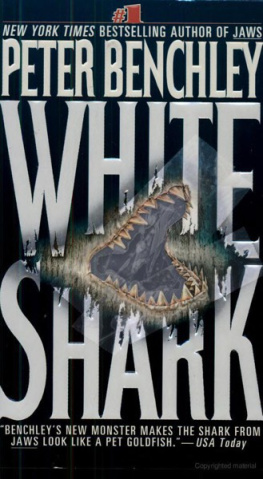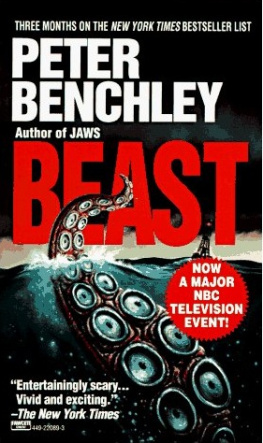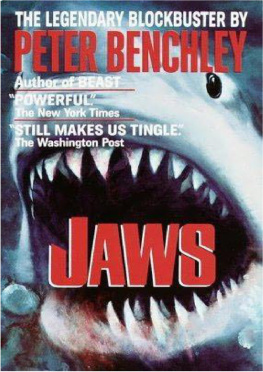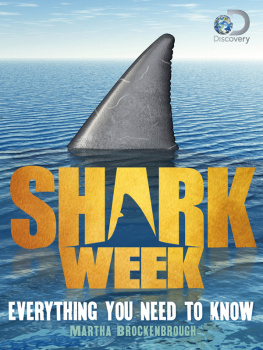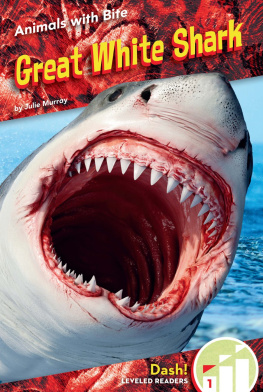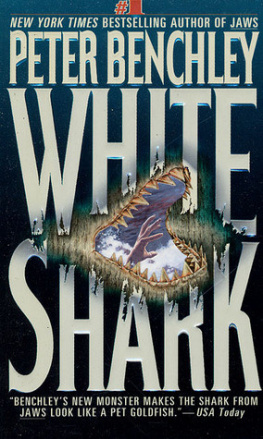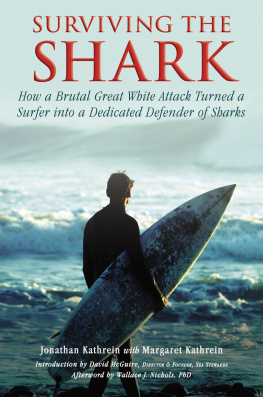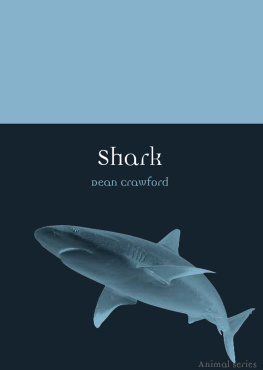Peter Benchley - White Shark
Here you can read online Peter Benchley - White Shark full text of the book (entire story) in english for free. Download pdf and epub, get meaning, cover and reviews about this ebook. year: 1994, publisher: Random House, genre: Detective and thriller. Description of the work, (preface) as well as reviews are available. Best literature library LitArk.com created for fans of good reading and offers a wide selection of genres:
Romance novel
Science fiction
Adventure
Detective
Science
History
Home and family
Prose
Art
Politics
Computer
Non-fiction
Religion
Business
Children
Humor
Choose a favorite category and find really read worthwhile books. Enjoy immersion in the world of imagination, feel the emotions of the characters or learn something new for yourself, make an fascinating discovery.
- Book:White Shark
- Author:
- Publisher:Random House
- Genre:
- Year:1994
- Rating:3 / 5
- Favourites:Add to favourites
- Your mark:
- 60
- 1
- 2
- 3
- 4
- 5
White Shark: summary, description and annotation
We offer to read an annotation, description, summary or preface (depends on what the author of the book "White Shark" wrote himself). If you haven't found the necessary information about the book — write in the comments, we will try to find it.
White Shark — read online for free the complete book (whole text) full work
Below is the text of the book, divided by pages. System saving the place of the last page read, allows you to conveniently read the book "White Shark" online for free, without having to search again every time where you left off. Put a bookmark, and you can go to the page where you finished reading at any time.
Font size:
Interval:
Bookmark:
White Shark
by
P e t e r B e n c h l e y
Part One
1945
The water in the estuary had been stillfor hours, as still as a sheet of black glass, for there was no wind to stirit.
Then suddenly, as if violated by a greatbeast rising from the depths, the water bulged, heaved up, threatening toexplode.
At first, the man watching from thehillside dismissed the sight as yet another illusion caused by his fatigue andthe flickering light from the cloud-shrouded moon.
But as he stared, the bulge grew and grewand finally burst, pierced by a monstrous head, barely visible, black on black,distinguishable from the water around it only by the gleaming droplets shedfrom its sleek skin.
More of the leviathan broke through apointed snout, a smooth cylindrical body and then silently it settled backand floated motionless on the silky surface, waiting, waiting for the man.
From the darkness a light flashed threetimes: short, long, long; dot, dash,dash the international Morse signal for W. The man replied by lighting three matches inthe same sequence. Then he picked up hissatchel and started down the hill.
He stank, he itched, he chafed. The clothing he had taken daysago from a roadside corpse burying his own tailored uniform and handmadeboots in a muddy shell crater was filthy, ill fitting and vermin-infested.
At least he was no longer hungry: earlier in the evening he had ambushed arefugee couple, crushed their skulls with a brick and gorged himself on tins ofthe vile processed meat they had begged from the invading Americans.
He had found it interesting, killing thetwo people. He had ordered many deaths,and caused countless more, but he had never done the actual killing. It had been surprisingly easy.
* * * * *
He had been traveling fleeing fordays. Five? Seven? He had no idea, for stolen moments of sleepin sodden haystacks had blended seamlessly with hours of slogging alongshattered roads, in company with the wretched refuse of weak-willed nations.
Exhaustion had become his companion andhis plague. Dozens of times he hadcollapsed in ditches or flopped in patches of tall grass and lain, panting,till he felt himself revive. There wasno mystery to his fatigue: he was fiftyyears old, and fat, and the only exercise he had in the past ten years wasbending his elbow to sip from a glass.
Still, it was infuriating, abetrayal. He shouldn't have to be in good shape; he wasn't supposed to be running. He wasn't an athlete or a warrior, he was a genius who had accomplished something unprecedented in the history ofmankind. His destiny had always been tolead, to teach, to inspire, not to run like a frightened rat.
Once or twice he had nearly been seducedby exhaustion into succumbing, surrendering, but he had resisted, for he wasdetermined to fulfill his destiny. Hehad a mission, assigned to him on direct orders from the Fuehrer the day beforehe had shot himself, and he would complete that mission, whatever it cost,however long it took.
For though he was not aman of politics or world vision, though he was a scientist, he knew that hismission had significance far beyond science.
* * * * *
Now exhaustion, fear and hunger had allvanished, and as he made his way carefully down the steep hillside, ErnstKruger smiled to himself. His years ofwork would bear fruit; his faith had been rewarded.
He had never really doubted that theywould come, not once in the endless days of flight nor in the endless hours of waiting. He hadknown they would not fail him. Theymight not be clever like the Jews, but Germans were dependable. They did what they were told.
A small rubber boat was waiting whenKruger reached the pebble beach. One mansat at the oars, another stood on shore. Both were dressed entirely in black shoes, trousers, sweaters, woolencaps and their hands and faces had been blackened with charcoal. Neither spoke.
The man on shore extended a hand, offeringto relieve Kruger of his satchel. Krugerrefused. Securing the satchel to hischest, he stepped aboard the boat and, steadying himself with a hand on theoarsman's shoulder, made his way forward to the bow.
There was a sound of rubber scrapingagainst pebbles, then only the soft lap of oars pulling against calm water.
Two more men stood on the deck of theU-boat, and when the rubber boat glided up to its side, they helped Krugeraboard, took him to the forward hatch and held it open for him as he climbeddown a ladder into the belly of the boat.
* * * * *
Kruger stood behind a ladder in thecontrol room and listened to a blizzard of curt orders and immediateresponses. The air inside the submarinewas a fog. Every lightbulb had a halo ofmist around it, every metal surface was wet to thetouch. And the air was not only humid, itstank. He parsed the stench, andrecognized salt, sweat, diesel oil, potatoes and something sickly sweet, likecologne.
Kruger felt as if her were a prisoner inan infernal swamp.
He heard a muted sound of electric motors,and there was a faint sensation of movement, forward and down.
An officer wearing a white-covered capstepped away from the periscope, gestured to Kruger and disappeared into apassageway. Kruger bent his head to passthrough an open hatch, and followed.
They squeezed into a tiny cubicle abunk, a chair and a folding desk and the commander introduced himself. Kapitnleutnant Hoffmann was young, no morethan thirty, bearded, with the gaunt pallor of U-boat veterans. Around his neck he wore a Knight's Cross, andwhen it snagged in the collar of his shirt, he flicked it aside.
Kruger liked the insouciance of thegesture. It meant that Hoffmann had hadhis Ritterkreuz for some time, wasprobably entitled to wear oak leaves with it but didn't bother. He was good at his job, but that was alreadyobvious from the simple fact that he had survived. Nearly 90 percent of all the U-boats launchedduring the war had been lost; of thirty-nine thousand men who had sailed inthem, thirty-three thousand had been killed or captured. Kruger remembered hearing of the Fuehrer'srage as he had read those figures.
Kruger gave Hoffmann the news: of chaos in the country, of the retreat tothe bunker, of the Fuehrer's death.
"Who is the new leader of the Reich? " Hoffmann asked.
"Donitz," said Kruger. "But in fact, Bormann." He paused, debating whether to tell Hoffmannthe truth: there was no more Reich, not in Germany. If the Reich was to survive, the seeds of itssurvival were here, in this submarine. He decided that Hoffmann didn't need to know the truth. "Your crew?" he said.
"Fifty men, including you and me, allvolunteers, all party members, all single."
"How much do they know?"
"Nothing," Hoffmann said,"except that they're not likely to see home again."
"And the trip will take howlong?"
"Normally, thirty to forty days, butthese days aren't normal. We can't get outthe shortest way. The Bay of Biscay is a death trap, crawling with Allied ships. We'll have to go up around Scotland, get into the Atlanticand head south. I can make eighteenknots on the surface, but I don't know how much we'll be able to travel on thesurface. I'll have to maintain economyspeed, about twelve knots, so as to keep our range at about eighty-sevenhundred miles. If we're harassed, we'llspend more time submerged. We only makeseven knots submerged, and our E motors give out after sixty-four miles andneed seven hours of surface running to recharge. So the best I can give you is a guess: about fifty days."
Kruger felt sweat bead on his forehead andunder his arms. Fifty days! He'd been in this iron tomb for less than anhour, and already he felt as if a mailed fist were crushing his lungs.
"You'll get used to it," Hoffmansaid. "And when we get south,you'll be able to spend time on deck.
Next pageFont size:
Interval:
Bookmark:
Similar books «White Shark»
Look at similar books to White Shark. We have selected literature similar in name and meaning in the hope of providing readers with more options to find new, interesting, not yet read works.
Discussion, reviews of the book White Shark and just readers' own opinions. Leave your comments, write what you think about the work, its meaning or the main characters. Specify what exactly you liked and what you didn't like, and why you think so.

